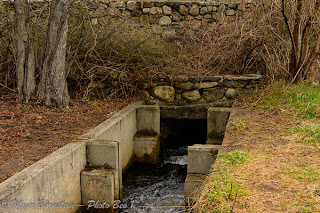 |
| Entrance to the park at the fish ladder |
One of the problems that occurred with the arrival of the Europeans to the North American continent was the utilization of the small steep rivers with dams and waterwheels for manufacturing and other purposes. There were laws enacted to require the dam owners to provide certain loop level of herring passage. By around 1920 a survey of herring stocks found them almost completely depleted and David Belding initiated the program of building fish ladders at dams. This program is continuing through today.
Starting in 2005 The Massachusetts Dept. of Marine Fisheries imposed a three-year ban on herring harvest, which has been continued to today to help increase the herring population. The number of herring have been increasing, and the Middleborough-Lakeville Herring Fisheries Commission has been participating in a program of helping to restock rivers that had their herring population almost completely disappeared. For three days, approximately 1000 herring per day are collected and released into those rivers. This year, the Commonwealth of Massachusetts collected for one day and the state of Rhode Island collected for two days.
 |
| Fish ladder runs under the road |
 |
| Fish ladder |
 |
| Passageway under the road |
 |
| Fish Ladder |
 |
| Truck to transfer the herring |
 |
| Catching the herring |
 |
| Transferring |
 |
| Herring in the net |
 |
| Transferring to the holding tank |
 |
| Talking to the school group |
 |
| Add caption |

No comments:
Post a Comment